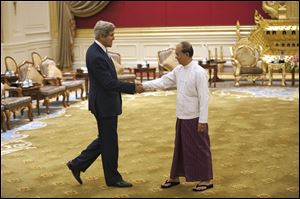
Kerry urges Myanmar to speed democratic transition, halt rights backslide
8/9/2014
U.S. Secretary of State John Kerry, left, shakes hands with Myanmar President Thein Sein during their meeting Saturday at the Presidential hall outside the venue of the 47th ASEAN Foreign Ministers' Meeting in Naypyidaw.
NAYPYITAW, Myanmar — U.S. Secretary of State John Kerry warned the leaders of Myanmar on Saturday that improved relations with the United States will require a significant speed-up in its democratic transition and a halt to what Washington sees as backsliding on commitments to improve human rights.
After hailing Myanmar’s decision to end decades of direct military rule that resulted in the easing of some U.S. sanctions and a 2012 visit by President Barack Obama, Washington has become alarmed at worsening conditions in Myanmar, including anti-Muslim discrimination, violence and infringements on press freedom.
U.S. officials said Kerry raised those issues in meetings with Myanmar President Thein Sein and leading lawmakers. He also urged that they proceed apace with constitutional reforms to ensure that elections set for next year are free, fair and credible.
Obama is due to return to Myanmar in November for a summit of Asian leaders and the officials said Kerry had made clear to Thein Sein and members of parliament that the U.S. would look favorably on tangible measures taken to address the concerns before that visit.
The officials said Obama planned to attend the East Asia Summit regardless but stressed that until improvements are seen, it is unlikely that Washington will move to further ease sanctions enacted over the course of 40 years of military government. The officials spoke on condition of anonymity because they were not authorized to publicly discuss Kerry’s closed-door meetings.
Kerry himself, in remarks to the foreign ministers of the 10 members of the Association of Southeast Asian Nations, did not raise the concerns but did say the U.S. wanted to work with Myanmar to help it overcome difficulties in the transition.
“As Myanmar tackles the challenges ahead, I want the people of Myanmar to know that they have the support and friendship of the United States,” Kerry said, noting that Obama looked forward to returning to the country.
Last week, more than 70 U.S. lawmakers called on the Obama administration to impose sanctions on Myanmar’s officials and others complicit in rights abuses and atrocities. And, they said they would oppose further concessions to the reformist government unless major progress is achieved.
Secular violence is perhaps worst in Rakhine state, where Buddhist mobs are accused of attacking Rohingya Muslims, a phenomenon that has spread to other parts of the country, sparking fears that nascent democratic reforms in the predominantly Buddhist nation of 60 million people that emerged from a half-century of dictatorship and military rule with a 2010 election, could be undermined by growing religious intolerance.
In addition, U.S. officials have accused Myanmar authorities of falling short on commitments to protect freedom of speech, including the recent sentencing of five journalists to 10 years at hard labor for a disputed story about a weapons factory.
Kerry is in Naypyitaw for the Association of Southeast Asian Nations Regional Forum, an annual security dialogue. He will finish at the forum on Sunday and travel to Myanmar’s largest city of Yangon for talks with opposition leader Aung San Suu Kyi before heading to Australia for strategic talks with Defense Secretary Chuck Hagel.